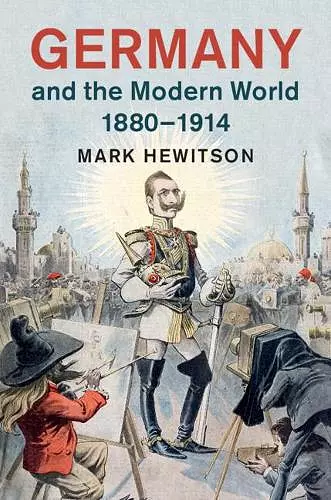Germany and the Modern World, 1880–1914
Format:Paperback
Publisher:Cambridge University Press
Published:5th Jul '18
Currently unavailable, and unfortunately no date known when it will be back
This paperback is available in another edition too:
- Hardback£95.00(9781107039155)

Re-assesses Germany's relationship with the wider world before 1914 by examining the connections between nationalism, transnationalism, imperialism and globalization.
Before 1914, how did contemporaries in Imperial Germany from different social groups and political backgrounds conceive of themselves, local and national politics, and the German Empire's place in the world? This book addresses these questions, reassessing the new claims being made for the importance of empire to Germany's development.The German Empire before 1914 had the fastest growing economy in Europe and was the strongest military power in the world. Yet it appeared, from a reading of many contemporaries' accounts, to be lagging behind other nation-states and to be losing the race to divide up the rest of the globe. This book is an ambitious re-assessment of how Wilhelmine Germans conceived of themselves and the German Empire's place in the world in the lead-up to the First World War. Mark Hewitson re-examines the varying forms of national identification, allegiance and politics following the creation and consolidation of a German nation-state in light of contemporary debates about modernity, race, industrialization, colonialism and military power. Despite the new claims being made for the importance of empire to Germany's development, he reveals that the majority of transnational networks and contemporaries' interactions and horizons remained intra-European or transatlantic rather than truly global.
'In Germany and the Modern World, 1880–1914 Mark Hewitson develops an astutely measured, non-polemical appraisal of the concept of the 'globalized nation' on the eve of the First World War, setting the irreducible Europeanness of Germany's dynamism beside and against the wider overseas expansionism. An authoritative, timely and beautifully executed intervention.' Geoff Eley, University of Michigan
'This is simply an impressive contribution by Mark Hewitson. The book makes a timely, crucial and critical contribution to the German Empire and its interwoven relationships within Europe and beyond in a globalizing world around 1900.' Bernhard Struck, University of St Andrews
'This is a welcome historical analysis of German national identity in the era before the First World War, during what is often called the 'first global age'. The study, which challenges many of the claims made about the impact of globalization, is certain to provoke reflection and controversy.' Roger Chickering, Georgetown University, Washington DC
'Wide ranging and ambitious, Hewitson's examination of the process of German nation building integrates topics that include modernity, globalization, transnationalism, imperialism, nationalism, and racism. Scholars will also find considerable value in Hewitson's extensive engagement throughout with varied strands of historiographic literature. Highly recommended.' A. C. Stanley, Choice
'By highlighting the ways in which the expansion of transnational contacts and networks shaped - or failed to shape - public discourses on imperialism, nationalism, economics, and foreign policy, he makes a compelling case for continuing to situate the nation-state at, or near, the center of studies of the first phase of globalization. As a result, Germany and the Modern World, 1880–1914 will be essential reading for scholars and students of German history on the eve of the 'short twentieth century'.' Gavin Wiens, H-Transnational German Studies
'Hewitson has written a very balanced book, full of new and often surprising insights … He debunks many traditional assumptions, and presents interesting contemporary illustrations … A timely and welcome book indeed.' Martijn Lak, European History Quarterly
ISBN: 9781107611993
Dimensions: 228mm x 153mm x 26mm
Weight: 860g
528 pages